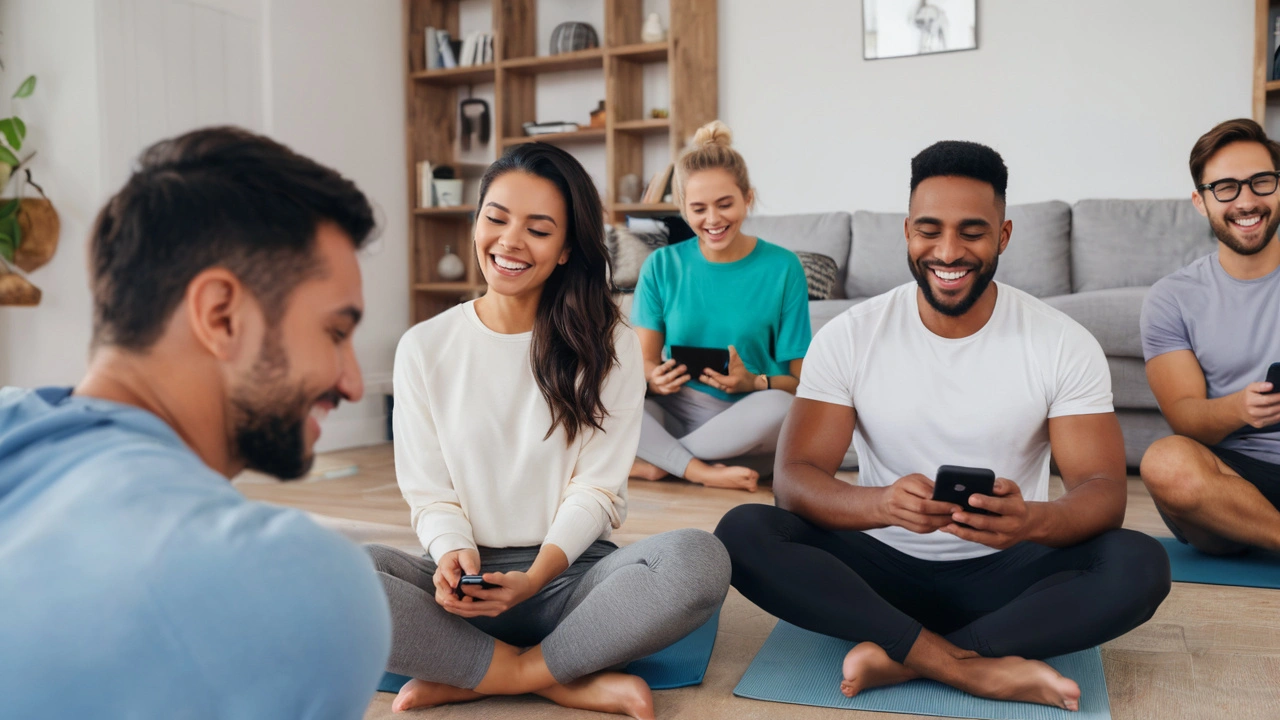Social media has become an integral part of our lives. For many, it's the first thing they check in the morning and the last thing they glance at before bed. Our connections, news updates, and even work collaborations are tethered to social platforms.
On one hand, social media can foster strong relationships and provide a sense of community. On the other, it has been linked to anxiety, depression, and other mental health issues. This article explores both sides of the coin, helping you navigate the digital world while keeping your mental well-being in check.
- Introduction to Social Media Usage
- Positive Effects on Mental Health
- Negative Effects on Mental Health
- The Role of Algorithms
- Balancing Online and Offline Life
- Practical Tips for Healthy Social Media Use
Introduction to Social Media Usage
Social media started as a simple idea: connect people. In just a decade, it has grown into a massive network of platforms that touch nearly every part of our lives. Millions of people worldwide use these platforms daily for everything from keeping in touch with family to catching up on news and sharing life moments. These platforms have names we all know - Facebook, Instagram, Twitter, TikTok, and LinkedIn.
Social media's rapid growth can be traced back to Facebook's launch in 2004. By 2021, Facebook had around 2.8 billion monthly active users. Not long after, Twitter and Instagram followed, each bringing something unique to the digital space. Twitter became famous for its fast-paced, real-time updates, making it a go-to for news and trends. Instagram focused on visual storytelling, encouraging users to share snapshots of their lives. Then came TikTok, which catapulted short-form video content into the mainstream, attracting a younger audience and creating viral trends almost overnight.
Each of these platforms offers a different experience, but they all share common ground in changing how we communicate. We can now share a message, a photo, or a video clip to a wide audience with just a few taps on our phones. This ease of communication has fundamentally changed our social interactions. We've moved from intimate, face-to-face conversations to digital chats that can span across continents in seconds. For many, social media is not just a tool but a lifeline. It connects us to people, ideas, and events we might never encounter otherwise. The imagery of someone sharing a video of their pet from thousands of miles away is something previous generations could only dream of.
The allure of being constantly connected, however, comes with its own set of challenges. While social media links us in ways previously unimagined, it also demands our constant attention. Notifications buzz throughout the day, drawing us back into the digital realm. Sometimes, this constant connectivity feels overwhelming, almost like a digital onset of social obligations. Despite the positives, it's easy to see why there are growing concerns about how this constant usage impacts our mental well-being.
According to a 2022 study published in 'The Lancet,' people who used social media for prolonged periods reported higher levels of anxiety and depression than those who used it sparingly. The study highlighted that it's not just the time spent but the type of engagement that matters. Engaging in passive activities, like endlessly scrolling through feeds, contributed more to negative mental health outcomes than active participation, such as commenting and sharing.
One interesting aspect often discussed is how social media can negatively impact self-esteem. Platforms like Instagram and TikTok can create an illusion of perfection, where users only show their best moments. It's like watching someone else's highlight reel while being acutely aware of your own everyday struggles. This can lead to feelings of inadequacy and a distorted sense of self-worth. For young people, in particular, growing up in this environment can significantly shape their self-image.
"Social media has both the power to bring us closer and push us apart," says Dr. Amelia Foster, a leading psychologist specializing in digital behavior. "It's all about how we use it. Mindful engagement can enrich our lives, but mindless consumption can be detrimental."
Despite these challenges, there is also a range of positive outcomes stemming from social media use. Many have used these platforms to find supportive communities and groups, particularly valuable for individuals dealing with specific challenges or interests. Online forums provide a sense of belonging and understanding that might be hard to find locally. For instance, parents of children with rare diseases can connect with others worldwide, sharing advice, stories, and support.
Positive Effects on Mental Health
While social media often receives a lot of criticism for its potential negative impacts, it also brings numerous positive effects on our mental health. For many people, it represents a valuable tool for communication and connection, particularly in times when physical distance is a barrier. Social media platforms like Facebook, Twitter, and Instagram enable users to share life's moments, stay connected with loved ones, and form new friendships.
One notable benefit of social media is the sense of community it fosters. Online communities can provide immense support for individuals going through tough times. For instance, support groups for mental health issues such as depression, anxiety, or chronic illnesses can be found on various platforms. These groups offer a space where users can share their experiences and get emotional support from individuals who understand their struggles.
Social media also helps combat loneliness, a widespread feeling in today’s fast-paced world. Connecting with friends, family, and like-minded individuals can provide a feeling of belonging and emotional connection. Especially during the COVID-19 pandemic, social media became a lifeline for many, facilitating virtual contact when physical meetings were not possible.
According to Dr. Arthur Cassidy, a psychologist specializing in social media effects, "The ability of social media to create and maintain social connections is unparalleled, especially for those isolated physically or emotionally."
Another positive effect is access to mental health education. Many organizations use social media to share informative content about mental health, providing tips and resources that might not be accessible otherwise. This content can range from articles and videos to infographics and live discussions, making mental health education more comprehensive and engaging.
Social media can also provide an outlet for self-expression and creativity. Platforms like Instagram and TikTok enable users to showcase their artistic talents, be it through photography, poetry, music, or dance. This creative expression can be therapeutic and contribute significantly to an individual’s emotional well-being.
Additionally, social media can promote physical activity, indirectly benefiting mental health. Various fitness communities and challenges encourage users to engage in regular exercise, known to be a powerful tool for improving mood and reducing stress. These initiatives not only motivate individuals to stay active but also create a sense of accountability through community support.
A study published by the Pew Research Center showed how teenagers using social media reported feeling more confident, less lonely, and less depressed compared to those who did not use these platforms as much. It’s evident that when used mindfully and positively, social media can enhance an individual’s mental health and well-being.
Support Networks
The concept of support networks online cannot be overstated. From parenting groups to coping with grief, the collective experiences shared and the empathy offered within these networks provide a solid emotional foundation for members. The ability to reach out at any time of day and receive almost instant feedback or advice is a form of reassurance that traditional support systems may not always be capable of offering.
In summary, while it is essential to acknowledge the potential downsides of social media, focusing on its positive aspects reveals a tool with significant benefits for mental health. By fostering connections, providing emotional support, enabling self-expression, and promoting educational content, social media has become an invaluable part of modern life that, when used wisely, can significantly enhance our well-being.

Negative Effects on Mental Health
It's undeniable that social media has changed the way we connect, communicate, and consume information. But this transformation has come with significant downsides, especially for our mental health. One of the most commonly reported negative effects is the feeling of inadequacy. With a constant stream of perfectly curated images and life updates, it's easy to fall into the trap of comparing ourselves to others. This can lead to feelings of low self-esteem and depression.
Another profound impact is the increase in anxiety levels. Constant notifications and the pressure to stay connected can be overwhelming. This feeling is heightened by the fear of missing out (FOMO), which exacerbates stress and anxiety. A study by the Royal Society for Public Health found that social media sites, particularly Instagram and Snapchat, accentuate these feelings among young people.
One cannot ignore the role of cyberbullying in the online world. Social platforms can sometimes become breeding grounds for harassment, bullying, and trolling. These negative interactions can leave lasting impacts, such as chronic stress, depression, and even suicidal thoughts. According to a survey by Ditch the Label, 42% of young people have experienced cyberbullying on Instagram.
The algorithms behind social media play a crucial role in maintaining user engagement. However, these algorithms can often push users towards negative content. A study by Netflix’s documentary "The Social Dilemma" highlighted how these algorithms can trap users in echo chambers, where harmful and polarizing content is amplified, leading to increased anxiety and fear.
The addiction to social media is another critical concern. The design of these platforms, with their endless scrolling features and constant notifications, is meant to keep us hooked. This addiction can disrupt daily routines, reduce productivity, and impair sleep. Researchers at Brunel University found that users who spent more than three hours per day on social media had a higher risk of sleep disturbances.
Moreover, overuse of social media can lead to isolation. While it might seem paradoxical, being perpetually connected online can reduce the quality of real-life interactions. Individuals may find themselves feeling lonely and disconnected, despite having many virtual interactions. Jane Adams, a social psychologist, remarked, "We are living in an era where we are more connected than ever, yet more lonely than ever."
To end on a factual note, the World Health Organization has listed excessive use of social media as a contributing factor to the rising rates of anxiety and depression worldwide. By understanding these negative impacts, we can take proactive steps to protect our mental health while still enjoying the benefits of social media.
The Role of Algorithms
Algorithms play a crucial role in shaping our social media experience. These intricate systems determine the content we see, tailoring our feeds based on engagement, preferences, and behaviors. By analyzing truckloads of data, social media platforms aim to keep users engaged for as long as possible. This personalized content delivery can make social media feel almost addictive.
For example, the YouTube algorithm, known as the recommendation engine, accounts for over 70% of the time users spend on the platform. By constantly pushing videos that align with your interests, it ensures you stay engaged. It's a double-edged sword. While this may keep you entertained, it can also trap you in an echo chamber, limiting exposure to diverse viewpoints.
Another significant aspect is the algorithms' role in amplifying emotions. Content that evokes strong reactions - whether joy, anger, or sadness - is more likely to be promoted. This is because algorithms prioritize engagement, frequently leading to sensationalized or emotionally charged content. As a result, users can find themselves caught in cycles of heightened emotional states, impacting overall mental well-being.
Facebook has drawn significant criticism for its algorithmic approach. Research has shown that the platform's algorithms can contribute to feelings of inadequacy and loneliness. A study by the University of Pennsylvania found a causal link between the amount of time spent on these platforms and increased levels of anxiety and depression.
Conversely, understanding how algorithms work can empower users. By being more mindful of their online behavior and critically assessing the content that algorithms serve, users can mitigate some adverse effects. It's also good practice to regularly review and adjust social media settings to cultivate a healthier and more balanced online environment.
Tristan Harris, a former Google Design Ethicist, stated, "The race for attention is putting the humanity of our society at risk."Algorithms thrive on attention. They constantly seek to predict and influence, subtly steering our digital journeys. Hence, it is essential to stay vigilant and maintain a conscious interaction with social media platforms.
Moreover, some social media platforms are beginning to recognize the need for change. Instagram, for instance, has experimented with hiding the number of likes to reduce social pressure. By creating a less comparative space, the platform hopes to improve users' mental health. These changes show a growing awareness of the need for a healthier balance between user engagement and well-being.
In the end, the role of algorithms in social media is a complex one. While they undoubtedly enhance our online experience by making content more relevant and engaging, they also pose risks to our mental health. By staying informed and proactive, we can harness the benefits of social media while minimizing its potential harms.

Balancing Online and Offline Life
In today's world, our digital lives are often inseparable from our physical ones. The constant notifications and endless content can make it difficult to disconnect, leading to a situation where our mental health takes a back seat. Establishing a balance between online and offline life is not just a luxury; it is crucial.
One of the simplest yet most effective ways to balance online and offline life is by setting boundaries. Limit the amount of time you spend on social media each day. Start by tracking your usage and identify peaks when you are most likely to mindlessly scroll. Once you have an understanding, set timers or use apps that help you control your time spent online.
Another practical tip is to create tech-free zones. Designate certain areas in your home, like the bedroom or dining area, where devices are not allowed. This helps you focus on the physical environment and those around you. It's amazing how much more present and engaged you become when your phone is out of sight and out of mind.
Spending time outside the digital world also improves your well-being. Go for a walk, cycle, or simply sit in a park. Research shows that being in nature can significantly reduce stress and anxiety levels. A study published in the Environmental Health Perspectives journal found that individuals who lived near green spaces reported better mental health compared to those who didn’t.
Always remember the importance of offline relationships. Prioritize face-to-face interactions over virtual ones. Whether it's catching up with a friend over coffee or spending time with family, real-world connections carry more emotional weight than online interactions. In several psychological studies, it’s been noted that deeper, in-person conversations contribute significantly to happiness and life satisfaction.
"We are creatures of community, and we require close relationships and social connection for our well-being," says Dr. Emma Seppala, Science Director of the Center for Compassion and Altruism Research and Education at Stanford University.
Another aspect of balancing online and offline life involves being mindful of the content you consume. Curate your social media feeds to include content that brings joy, inspiration, or knowledge. Avoid content that triggers negative emotions like envy or frustration. Over time, the algorithm adjusts to display more of what you find uplifting, making your online experience healthier.
Finally, consider digital detoxes. Set aside one day a week to go completely offline. Use this time to reflect, pursue hobbies, or engage in any activities that rejuvenate you. Detoxing occasionally can help reset your mental state and bring a sense of tranquility often lost in the hustle of digital life.
Balancing online and offline life takes conscious effort. However, with small, consistent steps, you can create a harmonious balance that benefits your mental health and overall well-being.
Practical Tips for Healthy Social Media Use
Maintaining mental well-being in the digital era is a skill that requires conscious effort. It's easy to fall into the trap of endless scrolling, but there are effective strategies to use social media healthily. These tips are designed to help you find the right balance, allowing you to enjoy the benefits of social platforms without compromising your mental health.
Set Time Limits: It’s important to regulate your time on social media just like you would with any other activity. Apps like Instagram and Facebook have built-in tools that allow you to track your usage. Set daily limits and reminders. Studies have shown that reducing social media usage to 30 minutes a day significantly lowers anxiety and depression levels.
Curate Your Feed: The content you consume can greatly impact your mood. Follow accounts that inspire and uplift you, and don't hesitate to unfollow or mute accounts that bring negativity. Your feed should be a reflection of your values and interests, so take control of what you see.
Engage Meaningfully: Rather than passively scrolling, engage with content that adds value. Comment on posts, join meaningful conversations, and use social media to foster real connections. Meaningful interactions are more likely to provide a sense of community and support.
Be Mindful of FOMO: The Fear of Missing Out (FOMO) is a common side effect of social media. Remember that people tend to post highlights of their lives, which are not always representative of reality. Practicing gratitude and focusing on your own life can reduce the feelings of inadequacy fueled by comparison.
Utilize Privacy Settings: Take control of your privacy. Social media platforms offer various settings to help protect your personal information. By adjusting these settings, you can limit who sees your posts and decrease the chances of encountering unwanted interactions.
Take Regular Breaks: Digital detoxes are essential. Taking periodic breaks from social media can help recharge your mental batteries. Whether it’s a weekend off once a month or a day off every week, find a schedule that works for you and stick to it.
Educate Yourself: Stay informed about the effects of social media on mental health. Awareness is the first step to making healthier choices. Read up on studies and articles from credible sources to understand how different behaviors on social platforms influence well-being.
“There is a growing body of evidence suggesting that excessive social media use is linked to mental health issues. It's essential to be mindful of how much time we spend online and make sure it doesn’t interfere with our overall well-being.” — Dr. Taylor Smith, Psychologist
Practice Self-Compassion: Remember that it’s okay to take a step back if social media becomes overwhelming. It’s essential to be kind to yourself. Acknowledge your feelings and take action to improve your mental space.






